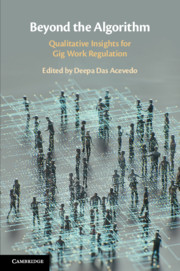Book contents
- Beyond the Algorithm
- Beyond the Algorithm
- Copyright page
- Contents
- Figures
- Tables
- Foreword
- Acknowledgments
- Introduction
- 1 The Rise and Scope of Gig Work Regulation
- 2 An Uber Ambivalence
- 3 Invisible Work, Visible Workers
- 4 The Importance of Qualitative Research Approaches to Gig Economy Taxation
- 5 Just a Gig?
- 6 Algorithmic Management, Employment, and the Self in Gig Work
- 7 Regulating Transportation Systems without Authority (or Data)
- 8 Words Matter
- 9 Rewriting the Rules
- 10 What Regulators Could Gain by Listening to Rideshare Drivers
- Index
- References
9 - Rewriting the Rules
Gig Companies’ Drive for Labor Deregulation
Published online by Cambridge University Press: 22 October 2020
- Beyond the Algorithm
- Beyond the Algorithm
- Copyright page
- Contents
- Figures
- Tables
- Foreword
- Acknowledgments
- Introduction
- 1 The Rise and Scope of Gig Work Regulation
- 2 An Uber Ambivalence
- 3 Invisible Work, Visible Workers
- 4 The Importance of Qualitative Research Approaches to Gig Economy Taxation
- 5 Just a Gig?
- 6 Algorithmic Management, Employment, and the Self in Gig Work
- 7 Regulating Transportation Systems without Authority (or Data)
- 8 Words Matter
- 9 Rewriting the Rules
- 10 What Regulators Could Gain by Listening to Rideshare Drivers
- Index
- References
Summary
In the last decade, companies have emerged that straddle the high-wage technology and low-wage service sectors. These so-called “gig” companies use technology platforms to manage on-demand piecework in a growing number of sectors, including taxi, delivery, domestic work, nursing, and education. Technology-facilitated work is only the latest iteration of the rise of “nonstandard” or “contingent” work that is subcontracted, temporary, freelance, or on-demand. Gig companies are using new methods of labor mediation to control work remotely without accepting responsibility for its quality, to extract rents from workers, and to shift risks and costs of service provision onto workers, consumers, and the general public. Their practices leave workers vulnerable to economic insecurity, discrimination and harassment.
This chapter describes the ways in which gig companies are shaping regulation that favors their business model and preempts challenges to their employment practices, including the strategies and tactics that companies are using to maintain an independent contractor workforce in the face of contestations from workers, consumers, and regulators. We suggest that the expanding set of business interests joining ranks with gig companies to rewrite employment standards threatens a recalibration of what workers in the US expect in exchange for their labor.
- Type
- Chapter
- Information
- Beyond the AlgorithmQualitative Insights for Gig Work Regulation, pp. 189 - 207Publisher: Cambridge University PressPrint publication year: 2020



